Apple Watch Series 10
Apple's latest Apple Watch with larger but thinner design, new S10 chip, and more.
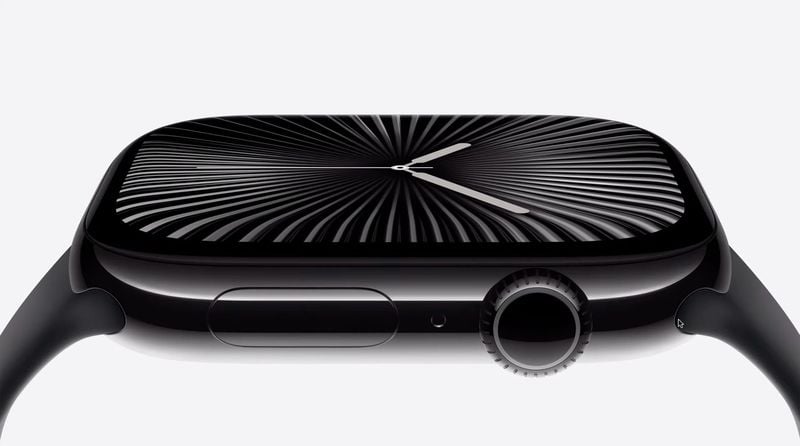
Should You Buy an Apple Watch Series 10?
Introduced in September 2024, the Apple Watch Series 10 is still early in its product cycle, which means now is a good time to buy. A new model won't be coming until September 2025.
The Apple Watch Series 10 is the thinnest and lightest Apple Watch to date, with Apple introducing larger displays with slimmed down bezels and better viewing angles. The Apple Watch Series 10 is the best Apple Watch for most people, offering all of the latest health features like heart rate tracking, sleep tracking, ECG, and sleep apnea detection. Note that in the United States, blood oxygen monitoring is not available.
Compared to the prior Series 9, the Series 10 has a new design, including a titanium material option, along with a water temperature sensor, depth gauge, and Tides app for activities like snorkeling. Pricing on the Series 10 begins at $399.
If you want something more affordable than the Series 10, it's best to check out the Apple Watch SE. If you can wear a larger watch, are a diver, or do a lot of outdoor activities, you should check out the Apple Watch Ultra, which is more expensive.
If you're having trouble deciding which Apple Watch is for you, we have a series of Buyer's Guides that walk you through all of the differences. You'll also want to take a look at our Apple Watch deals page to make sure you get the best price.
Apple Watch Series 10 Detailed
Contents
Apple debuted the Apple Watch Series 10 in September 2024, and it is the newest iteration of the Apple Watch that initially launched in April 2015. The Series 10 replaces the prior-generation Series 9.
Apple overhauled the design of the Apple Watch with the Series 10, introducing the first updated look in several years. The new model is thinner and lighter than prior versions, and it also has a larger display size with 9 percent more active screen area than Series 7, 8, and 9. The Series 10 is available in 42mm and 46mm size options, up from the prior 41mm and 45mm sizes. Apple says that the larger Series 10 model has the biggest display that it's added to an Apple Watch to date, and it's even larger than the Apple Watch Ultra 2 display.
The overall design of the Apple Watch remains the same with a square-shaped casing that has rounded edges, a slim-bordered display, sapphire crystal backing and Digital Crown with haptic feedback. Apple offers the Apple Watch Series 10 in aluminum or titanium, with titanium replacing stainless steel. The back of the Apple Watch is now metal instead of ceramic, with a sapphire crystal continuing to protect the included sensors. The metal integrates the Apple Watch antenna into the housing, saving component space, and Apple says that the matching metal for the front and back makes the Apple Watch look like it's made from a single piece of metal.
The aluminum Apple Watch Series 10 is available in jet black, rose gold, and silver, and the black color has a glossy, reflective shine rather than a brushed aluminum finish. The polished titanium version is available in slate, gold, and natural, and Apple says there is a reflective, jewelry-like finish. There are Hermès and Nike models, and Apple offers a variety of bands for the Apple Watch, including a new Titanium Milanese Loop and new Link Bracelet bands that match the Series 10 colors.
A new LTPO3 OLED display still supports maximum brightness of up to 2,000 nits, but it is up to 40 percent brighter when viewed at an angle. In dark rooms, the display remains dim but readable. Always-On display technology lets users see their watch face and complications at all times, and this year, the more efficient display lets always-on mode refresh once a second, enabling a ticking seconds hand that's visible without raising the wrist.
There are new watch faces that are meant to take advantage of the bigger display and faster refresh rate. The Flux watch face fills the screen with color second by second, and the Reflections watch face has a shimmering dial that reacts subtly to user movement.
The Series 10 features crack-resistant front glass, IP6X dust resistance, and a WR50 water resistance rating so it is swimproof. There is a new water temperature sensor that was once exclusive to the Apple Watch Ultra, and it can provide you with the water temperature when swimming or in the ocean. Apple also added a depth gauge that works up to 6 meters deep for activities like snorkeling and shallow diving.
There is a new Tides app on the Series 10 that provides seven rolling days of forecasted tidal information for coastlines and surf spots worldwide. It provides information on high and low tides, rising and falling tides, tide height and direction, and sunrise and sunset. There are also new tide-related complications for watch faces. The third-party Oceanic+ app that was an Ultra exclusive is now available for the Series 10 as well, providing information for snorkeling.
The Series 10 is equipped with an S10 chip with a 4-core Neural Engine for processing machine learning tasks. It does not appear that the chip offers speed improvements over the prior-generation S9 chip, but it was engineered to ensure a slimmer profile for the Apple Watch. There is still 64GB of storage.
Double Tap, a feature that uses the S10 chip, allows users to tap the index finger and thumb together in order to interact with the Apple Watch one-handed. Double Tap can be used to stop a timer, play/pause music, answer or end a call, snooze an alarm, and more.
Heart rate monitoring, blood oxygen detection, ECG readings, sleep tracking, fall detection, loud noise monitoring, and built-in temperature sensing continue to be available, though blood oxygen detection remains disabled on watches sold in the United States following an early 2024 legal ruling in a patent dispute. All of the above features are ones that Apple introduced with prior-generation models.
New this year is sleep apnea detection, a feature that uses accelerometer data collected during sleep to detect sleep disturbances. It can let you know if you might have sleep apnea so you can get checked out by your doctor. Sleep apnea detection is not a Series 10 exclusive and it also works on the Series 9 and Apple Watch Ultra 2.
A Crash Detection feature takes advantage of the watch's gyroscope and accelerometer along with an advanced sensor-fusion algorithm to detect severe car crashes and alert emergency services. When a crash occurs, the Apple Watch checks in with the user and if no response is received within a 10-second countdown, emergency responders are contacted. The Apple Watch Series 10 also supports Fall Detection.
Battery life remains the same at up to 18 hours, but it can be extended to 36 hours with Low Power Mode. Low Power Mode disables the Always-On display, turns off background heart rate measurements, limits Wi-Fi and cellular connections, and more.
Charging is faster than before, and the Series 10 can charge from 0 to 80 percent in approximately 30 minutes when using an appropriate fast charger.
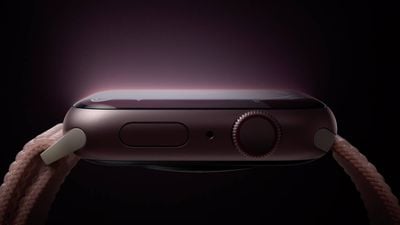
Apple is using the same second-generation Ultra Wideband chip in the Series 10 as in the Series 9. The UWB chip enables Precision Finding for locating a misplaced iPhone with visual, haptic, and audio guidance. The speaker has been updated to allow for media to play out loud, with no Bluetooth headphones required, and there is a new voice isolation neural network that suppresses background noise during phone calls.
Both GPS and GPS + Cellular models are available, and the cellular Apple Watches work with a separate cellular plan. Cellular models do not require a connection to an iPhone to work and receive data when Wi-Fi is unavailable.
Apple Pay purchases are available with credit and debit cards stored in the Wallet app.
The Series 10 is being sold alongside the larger, more expensive, and more rugged Apple Watch Ultra 2, plus the lower-cost second-generation Apple Watch SE.
Note: See an error in this roundup or want to offer feedback? Send us an email here.
How to Buy
The Apple Watch Series 10 models can be purchased from Apple retail locations, the online Apple Store, and third-party retailers like Best Buy and Target.
Reviews
Apple Watch Series 10 reviews have largely been positive, with reviewers appreciating that the device is available with the largest-ever display on an Apple Watch, while at the same time being thinner and lighter than the Apple Watch Ultra 2.
For as little as $399, you can get the Series 10 in an all-new Jet Black finish made with polished aluminum. Most reviews have praised this color option, which looks more like the previous stainless steel option that used to cost hundreds of dollars more. There are still some advantages to choosing the Apple Watch Ultra 2 over the Apple Watch Series 10, however, including up to double the battery life on a full charge, up to a 33% brighter display, and the customizable Action button.
Apple Watch Series 10 introduces another potentially life-saving health feature: the ability to detect sleep apnea, a disorder in which a person's breathing repeatedly stops and starts while they sleep. Available in more than 150 countries, this feature can keep track of nightly breathing disturbances that may be associated with sleep apnea. The feature has also been added to the Apple Watch Series 9 and Ultra 2, however, so you do not need to upgrade to the Series 10 for this feature alone.
Another new Series 10 feature is voice isolation on phone calls, which one reviewer described as "mind-blowingly good" in real-world testing.
While the Series 10 is yet another iterative year-over-year upgrade to the Apple Watch, the new features and changes introduced this year are still worth considering, according to reviewers. For more opinions on the Series 10, check out our full review roundup.
Design
The Apple Watch Series 10 features the first design update to the Apple Watch in several years. While it continues to feature the rounded, square look that Apple used for prior-generation models, the Series 10 is larger, thinner, and lighter weight. It is the thinnest Apple Watch to date, with Apple redesigning many of the internal components to achieve a slimmer look.

The soft, rounded edges of the Apple Watch display have slimmed down bezels, and casing sizes have been increased to 42mm and 46mm, up from 41mm and 45mm. Apple has replaced stainless steel with titanium, and the Apple Watch Series 10 is available in aluminum and titanium.
Compared to stainless steel, titanium is lighter and more durable, and better able to hold up to scratches and dings. Series 10 models weigh between 29.3 grams and 41.7 grams depending on size and material, with the titanium models coming in at about six grams heavier than aluminum models.

The 42mm Apple Watch Series 10 measures in at 42mm tall, 36mm wide, and 9.7mm deep, while the 46mm model measures in at 46mm tall, 39mm wide, and 9.7mm deep. Apple says the 42mm model fits 130mm to 200mm wrists, while the 46mm model fits 140mm to 245mm wrists.
Apple changed the design of the back casing, and rather than being made from ceramic, it is now made from color-matched aluminum so that the Apple Watch models look crafted from a single piece of metal. A crystal back continues to house the electrical heart sensor and optical heart sensors, plus there is a speaker/air vent at the back. The sensors enable health-monitoring features like heart rate detection, ECGs, and more.

There is a Digital Crown on the side of the Apple Watch for scrolling, navigation, and Smart Stack access, and there is a side button for bringing up frequently used apps, accessing emergency services, confirming Apple Pay purchases, and more.

The Digital Crown is equipped with haptic feedback that offers a precise, mechanical feel when scrolling through lists and controlling various aspects of the Apple Watch, and it is key for the ECG app because it has a built-in electrode that works in tandem with the rear sensors.
Colors and Materials
The Apple Watch Series 10 comes in aluminum and titanium, a new material being offered instead of stainless steel. The aluminum Apple Watch models are the most affordable, while the titanium models are pricier.
Aluminum colors include jet black, rose gold, and silver, and the jet black shade has been polished to be reflective using a 30-step anodization process. Titanium colors include slate, gold, and natural.

The aluminum Apple Watch models are made from 100 percent recycled 7000 series aluminum, are lightweight, inexpensive, and designed for an active lifestyle, while the titanium models are heavier, more expensive, and designed for everyday wear but are also ideal for activity.
The titanium models are made from aerospace-grade titanium that's been polished to a mirror-like shine. Apple says that the titanium Series 10 models weigh 20 percent less than the stainless steel Series 9 models.
Durability and Water Resistance
The Apple Watch Series 10 models feature the same stronger front crystal component, which Apple designed to be resistant to cracking and scratching.

The aluminum Apple Watch models feature Ion-X glass to protect the display, while the titanium models use sapphire crystal glass. Sapphire crystal glass offers better scratch resistance than Ion-X glass because it is a harder material, which means the sapphire crystal models are more resistant to scratching and everyday wear.
All Apple Watch Series 10 models feature IP6X dust resistance for use in environments like the beach or the desert, and they offer WR50 water resistance, rated for immersion in water as deep as 50 meters thanks to seals and adhesives. The speaker, which needs air to produce sound, is the only point of ingress and has been designed to expel water using sound vibrations after exposure to moisture.
Because it is rated for 50m immersion, the Apple Watch can be used when swimming in the ocean or in a pool. It is only suited to shallow water activities, but this year's model can be used for snorkeling and shallow diving up to 20m deep. Apple recommends against wearing the Apple Watch Series 10 for scuba diving, waterskiing, showering, or other activities that involve high-velocity water or deep submersion. For these water activities, the Apple Watch Ultra is recommended.
Apple's Apple Watch warranty does not cover water damage, so it is best to exercise caution when exposing the device to water.
Water Temperature Sensor and Depth Gauge
The Apple Watch Series 10 has a depth gauge and a water temperature sensor, which Apple says can be used for activities like swimming, shallow diving, and snorkeling.
The Depth gauge is able to measure up to six meters below the water's surface.
There's also a dedicated Tides app that provides information on high and low tides, rising and falling tides, tide height and direction, and sunrise and sunset.

Speaker
There is a single speaker in the Series 10, and this year, it supports audio playback without connected headphones. The Apple Watch Series 10 can play music out loud for the first time.
Display
Apple revamped the display in the Series 10, and the new models have the biggest display to date. The 42mm model has a 374x446 resolution with 989 sq mm of display area, while the 46mm model has a 416x496 resolution with a 1220 sq mm display area.

Along with more viewable area, Apple used upgraded LTPO3 OLED display technology, which provides a wider viewing angle. When viewed at an angle, the Series 10 display is up to 40 percent brighter. Maximum brightness is still 2000 nits, and minimum brightness is 1 nit. This year, the 1 nit minimum brightness improves the always-on display, allowing for a second hand that updates even when the wrist is down.
With the always-on edge-to-edge display, the watch face, time, and complications, are continually visible. The display dims when the wrist is down in order to preserve battery life, but key features like watch hands remain illuminated all the time.

Touching the watch face or raising the wrist brings the display back to full brightness, and to minimize battery drain, Apple has optimized watch faces for the feature. The Apple Watch's display also has a variable refresh rate that drops from 60Hz to as low as 1Hz when the watch is inactive.
S10 Chip
The Apple Watch Series 10 is using an S10 System-in-Package (SiP) with a 64-bit dual-core processor. Apple overhauled the Apple Watch chip with last year's Series 9, and there appear to be negligible updates to the Series 10 chip. It has 5.6 billion transistors and a four-core Neural Engine for machine learning tasks, but it is smaller than the prior-generation S9 chip.
Double Tap Gesture
The S10 chip powers Double Tap, a gesture that you can use to control the Apple Watch. When you double tap your index finger and thumb, the sensors in the Apple Watch detect the motion and can activate what's on the display, allowing you to do things like answer a call, end a call, open a notification, play or pause music, start or stop a timer, check your Smart Stack, and more. Double Tap also works in third-party apps.
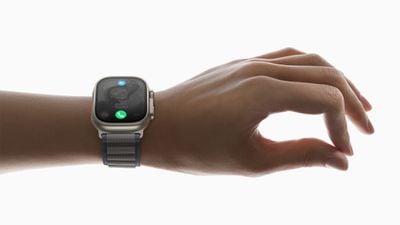
Storage
The Apple Watch Series 10 has 64GB of storage, the same as the Series 9.
Health Features
The Apple Watch Series 10 includes a third-generation optical heart rate sensor that calculates metrics like calorie burn, resting heart rate, and a heart rate that's too high, and the electrical heart rate sensor can be used for taking electrocardiograms, while LEDs and infrared light enable blood oxygen monitoring. A built-in accelerometer and gyroscope enable other important health-related features such as fall detection.
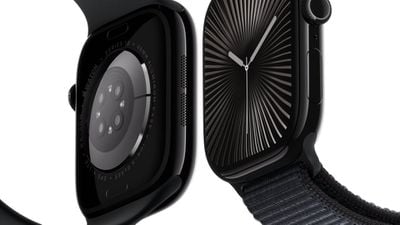
The Apple Watch can detect a low heart rate, a high heart rate, and an abnormal heart rate, monitoring for health problems like atrial fibrillation and sending notifications when anomalies are detected.
ECGs
Electrodes in the back of the Apple Watch and the Digital Crown work together to allow users to take single-lead electrocardiograms. An ECG measures the electrical activity of the heart and can be used to diagnose health conditions by a doctor.
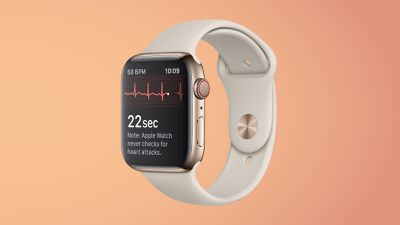
ECGs are captured by holding a finger on the Digital Crown of the Apple Watch and can detect a sinus rhythm (normal), an abnormal result, or, sometimes, an inconclusive result that should be shared with a doctor. The ECG is able to detect atrial fibrillation at heart rates above 100 beats per minute.
A single-lead ECG like the Apple Watch means there are two points of contact measuring the electrical sensations of your heart. Clinical electrocardiograms done by your doctor can have six to 12 leads for greater accuracy, but the Apple Watch offers the convenience of being able to take an ECG anytime anywhere in approximately 30 seconds.
Sleep Tracking
The Apple Watch Series 10 models can be worn at night to keep track of your sleep. It monitors when you're awake and when you're asleep, letting you know how much time you spent in the REM, Core, and Deep sleep stages. Sleep tracking also lets you know how often you've woken up in the night and for how long.
![]()
Sleep Apnea Detection
Using the accelerometer, the Apple Watch Series 10 can determine whether the wearer might suffer from sleep apnea. Sleep apnea causes breathing to stop repeatedly, resulting in disrupted sleep.
The Apple Watch is able to sense small movements at the wrist that are associated with interruptions in normal respiratory patterns, and the data can provide insight into the restfulness of sleep.

The Series 10 is able to analyze 30 days of sleep, letting you know if signs of sleep apnea are detected. Sleep apnea data can be viewed in the Health app on iPhone in a new Sleep Disturbances category.
Crash Detection
Updated motion sensors and an advanced sensor-fusion algorithm allow the Apple Watch Series 10 to detect a severe car crash and alert emergency services. After a crash is detected, the Apple Watch checks in with the user and then dial emergency services after a 10-second period with no response. It also alerts emergency contacts.
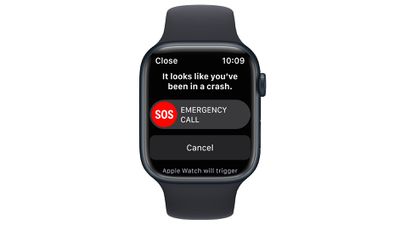
Temperature Measurements
There are two temperature sensors in the Series 10, including one that measures the temperature at the wrist and one that measures the ambient temperature in the air to cut down on outside bias.
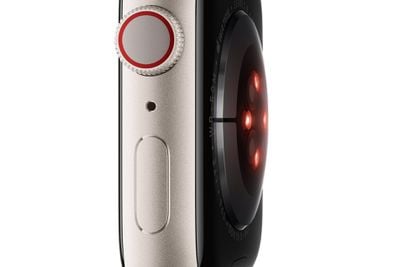
The wrist temperature sensor is primarily designed for women's health. It is able to take temperature readings every five seconds when the wearer is asleep, aggregating the data in the Health app. Temperature fluctuations can provide data on overall health, but it is also useful for fertility planning.
The Apple Watch Series 10 is able to deliver retrospective ovulation estimates, letting users know when they might have ovulated for better cycle tracking. Apple says temperature sensing also improves period predictions for those who menstruate.
Blood Oxygen Monitoring
The Apple Watch Series 10 has a blood oxygen monitoring function, but it is disabled in the United States due to a patent disagreement. Blood oxygen monitoring is available in other countries, and the sensor is likely still included in U.S. models but deactivated by software.
Blood oxygen saturation in a healthy individual is around 95 to 100 percent, and when the percentage of oxygen in the blood drops below that, it can be indicative of a serious health issue that needs immediate attention.
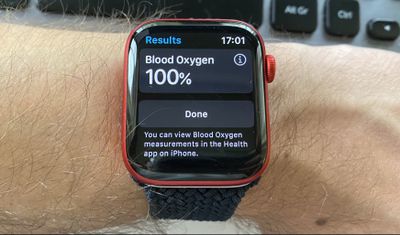
In the Series 10, green, red, and infrared LEDs shine light onto the blood vessels in the wrist, with photodiodes measuring the amount of light reflected back. Apple's algorithms then calculate the color of the blood, which is an indication of how much oxygen is present. The Series 10 can measure blood oxygen between 70 and 100 percent.
The Apple Watch Series 9 was facing a U.S. import ban due to the blood oxygen sensor, which the International Trade Commission claims violates patents owned by medical device company Masimo. To avoid a sales ban, Apple is selling a version of the the Apple Watch Series 9 that has a disabled blood oxygen sensor, and that ban extends to the Series 10.
If Apple can reach a settlement with Masimo, or wins a future appeal, the blood oxygen functionality could be reenabled through a software update.
Battery Life
Apple advertises "all-day" 18-hour battery life for the Apple Watch Series 10 models, which can be increased to up to 36 hours with Low Power Mode.
Apple bases "all-day" battery life estimates on 300 time checks, 90 notifications, 15 minutes of app use, and a 60-minute workout with music playback via Bluetooth. For LTE models, Apple assumes four hours of LTE connection and 14 hours of connection to an iPhone. In some situations, the Apple Watch drains faster, such as during calls or workouts.

The Apple Watch Series 10 can fast charge with Apple's Magnetic Fast Charger USB-C Cable and a 20W or higher power adapter. It takes approximately an hour for the Series 10 to charge from 0 to 100 percent.
The Series 10 can provide eight hours of standard usage time with a 15 minute charge, and up to eight hours of sleep tracking time with an eight minute charge.
Connectivity
Apple Watch Series 10 models are equipped with an Apple-designed W3 chip, and there are two variants available: GPS and GPS + Cellular. GPS + Cellular models have a built-in LTE chip and can connect to LTE without an iPhone, while GPS models are Wi-Fi only.

LTE connectivity has been available since the Apple Watch Series 3, and with an LTE connection, the Apple Watch is untethered from the iPhone and does not require an iPhone or known Wi-Fi network for an internet connection.
The Apple Watch is still not entirely independent from the iPhone, because LTE connectivity through a carrier requires an Apple Watch and an iPhone 6s or later to share a cellular plan with the same carrier. The Apple Watch also does not have the battery capacity to be used constantly without an iPhone nearby.
Ultra Wideband Chip
The Apple Watch Series 10 has a second-generation Ultra Wideband (UWB) chip, which is also in the iPhone 15 and 16 models. The second-generation chip enables highly accurate short-range wireless that supports features like car keys, the feature that allows an Apple Watch (or iPhone) to be used in lieu of a physical car key.
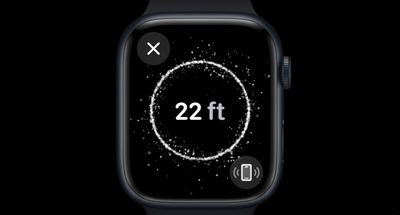
The UWB chip also allows the Apple Watch to track AirTags, and it allows an Apple Watch to use Precision Finding to track down a misplaced iPhone, even if it is in the same room. With the HomePod, when an Apple Watch gets within four meters of a HomePod that is playing audio, the Apple Watch Series 10 shows a Now Playing interface for media control. If nothing is playing on the HomePod, the Apple Watch shows media suggestions at the top of the Smart Stack.
Emergency SOS
LTE connectivity enables an international Emergency SOS feature that was first released with the Series 5. With Emergency SOS, the Apple Watch can make international calls to emergency services regardless of where the device was originally purchased or if there's an active cellular plan.
That means if you're traveling to another country and are injured or in a situation where you need help, you can activate the SOS feature on the Apple Watch by holding down the side button to automatically get in touch with that country's emergency services. International emergency calling works with the Apple Watch's fall detection feature, so if that's enabled, it automatically places an emergency call if the watch senses the user has taken a hard fall and remains motionless afterward.
Wi-Fi, Bluetooth and GPS
Apple Watch Series 10 supports 2.4GHz and 5GHz 802.11n Wi-Fi, and Bluetooth 5.3, which offers longer range, faster speeds, larger broadcast message capacity, and better interoperability with other wireless technologies.
GPS has been included in the Apple Watch since the Series 2, and all Series 10 models, LTE and non-LTE, feature a GPS chip that allows the Apple Watch to determine its position without needing to be near an iPhone.
With GPS, the Apple Watch is able to keep tabs on speed, distance, and route when you're walking, running, hiking, or biking, providing more insight into your fitness activities. GPS, GLONASS, Galileo, and QZSS systems are supported for positioning technology across multiple countries.
Nike and Hermès Models
The Nike Apple Watch was created in partnership with Nike and is designed specifically for runners. Nike Apple Watch models are all made from aluminum and are the same price as the standard aluminum Apple Watches.
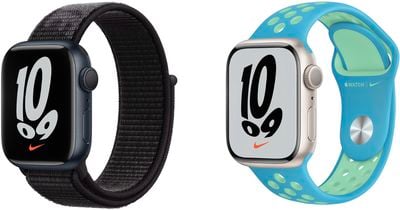
Nike Apple Watches come with Nike watch faces (though the watch faces are available on all iPhone models) and unique Nike-themed bands.
The Hermès Apple Watch collection was created in partnership with French fashion house Hermès and features some of the most expensive Apple Watches Apple offers because of the high price of the bands.
All Hermès models feature a titanium Apple Watch body paired with one of the Hermès signature hand-crafted bands and an additional orange Hermès-branded Apple Watch Sport Band. Hermès Apple Watches include unique watch faces based on Hermès watch designs.
Apple Watch Ultra and Apple Watch SE
The Apple Watch Series 10 is being sold alongside the more expensive Apple Watch Ultra 2, priced at $799, and the more affordable Apple Watch SE, priced starting at $249.

The Apple Watch SE uses an older design and it does not feature a blood oxygen sensor or ECG capabilities, while the high-end Apple Watch Ultra is aimed at adventurers and explorers with a larger 49mm case size, longer battery life, and a more rugged build.
What's Next for the Apple Watch
Apple is planning to stop using Intel cellular modems in future Apple Watch models, instead adopting technology from MediaTek. MediaTek's modem chip will bring support for 5G recap, a 5G service designed for wearables that don't need standard 5G speeds. As of right now, Apple Watch models are limited to LTE, so 5G Recap could bring connectivity improvements.
Apple could introduce blood pressure monitoring for the Apple Watch as soon as 2025. The feature would not provide exact systolic and diastolic blood pressure measurements, but it would send an alert if hypertension is detected over time. After receiving an alert, an Apple Watch user will be able to provide information to a medical professional for additional testing.
Apple is running into unspecified problems with blood pressure monitoring. For that reason, we may not see the new health option added to the Ultra 3 and other 2025 Apple Watch models.
A non-invasive blood glucose monitoring feature is still years away from launching despite 15 years of work, Bloomberg's Mark Gurman said in March 2025. There is no word on when it might be introduced.
Apple Watch Series 10 Changelog
- April 11 - Updated buyer's guide info.
- April 1 - Added info on next-generation Apple Watch.
- January 8 - Updated buyer's guide info.
- November 19 - Updated with new video.
- October 16 - Updated with new Ultra 2 vs. Series 10 buyer's guide.
- October 10 - Updated with new buyer's guide.
- September 12 - Roundup overhauled for Series 10 launch.

